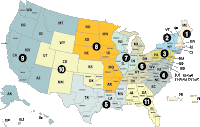In Erickson v. Irving (3D07-1963, 3D07-1790, & 3D07-604), the Third District reversed the district court's judgment and remanded for a new trial. The court concluded "that the trial court erred in allowing the defense of joint enterprise to be submitted to the jury."
In order to establish the existence of a joint enterprise concerning the operation of a motor vehicle, the defendant must prove the following elements: 1) an agreement, express or implied, to enter into an undertaking, 2) a community of interest in the objects and purposes to be accomplished in the undertaking, and 3) equal authority to control the undertaking. Kane v. Portwood, 573 So. 2d 980, 985 (Fla. 2d DCA 1991).
***
The evidence in this case fails to establish that a joint enterprise existed between Long and Sindoni. As stated above, a mere "joy ride," or decision that persons will travel together to a social engagement or have plans in common is generally insufficient to establish a joint enterprise. Additionally, the fact that Sindoni purchased Long’s drinks at the Coral Gables bar is also not evidence of a community of interest in the object and purpose of the evening. Moreover, the fact that one person pays the attendant expenses for a drive, the purpose of which is social, does not necessarily amount to a joint enterprise and certainly in this case is evidence of no more than a gift. As such, we conclude that the first two required elements for a joint enterprise defense – agreement and a community of interest – were not established.



0 comments:
Post a Comment